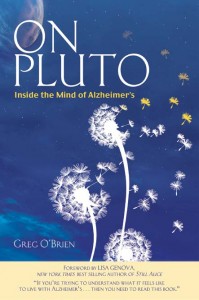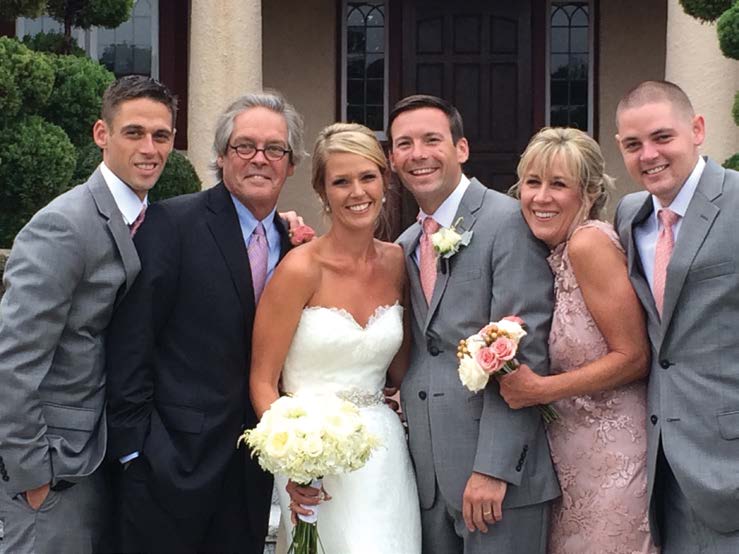Poignant new book offers an honest firsthand perspective of Alzheimer’s disease

Greg O’Brien knows what memory loss looks like, having cared for his mother during her bout with Alzheimer’s disease prior to her death in 2008. But, unlike most caregivers, he also knows what memory loss feels like, having received his own diagnosis of early-onset Alzheimer’s disease in 2009 at the age of 59.
Rather than hide behind his illness, Greg decided to face it head-on in the only way he knew how: by chronicling it. Using his decades of experience as a writer and journalist, he began to take notes detailing his ongoing journey through cognitive decline. The result is a newly released book titled On Pluto: Inside the Mind of Alzheimer’s, which Greg describes as a document written by an investigative reporter embedded inside his own brain—a brain capable of taking him “out to Pluto, where no one can see you or hear what is said.” (A glimpse into Greg’s life and the impact Alzheimer’s disease is having on his family is also captured in a touching short documentary by award-winning filmmaker Steve James called A Place Called Pluto.)
Doctors have told Greg that a head injury from a serious 2004 bicycle accident likely “unmasked” symptoms of dementia that might otherwise have remained hidden for longer. Tests have also confirmed that he carries the marker gene for Alzheimer’s disease, which afflicted his maternal grandfather as well as his mother. Now, with worsening short-term memory issues, occasional trouble recognizing long-time friends, and bothersome hallucinations, Greg has good days and bad days. His goal is to share as many of his insights as possible before his ability to do so is irreparably altered.
Candid, illuminating, and occasionally even light-hearted, On Pluto provides a firsthand perspective of cognitive impairment and its rippling effects. While it tells Greg O’Brien’s personal tale, it will resonate with anyone dealing with or suffering from any form of dementia.
We spoke with Greg; his wife, Mary Catherine; and the eldest of their three adult children, Brendan, about the book and the story it so frankly tells.
The inside perspective.
Preserving Your Memory: What was your primary goal in documenting your experience through On Pluto?
Greg O’Brien: I felt the overriding need to write a book about living with Alzheimer’s, not dying with it, and doing so with faith and humor and hope. I want to dispel the myth that Alzheimer’s is only about the end stage by helping people understand the early and mid stages. Because this thing is often a 20-year roller coaster ride that has its ups and downs.
PYM: What do you want caregivers to know about what it’s like to experience Alzheimer’s that they can only learn from someone who has the disease?
GO: Caregivers are the unsung heroes in this war on Alzheimer’s. They deal with a tremendous assault that those with Alzheimer’s are not aware of when they get to the end stages because the memory of a caregiver never wanes. Even though you sometimes feel totally alone with this disease, you want to know instinctively that there’s someone there next to you who has your back. It’s not going to make you well, but there’s comfort in knowing that someone loves you because there are times in Alzheimer’s when you don’t love yourself. Caregivers do an extraordinary job. Without caregivers in this fight against Alzheimer’s, we would all lose.
PYM: You write about serving as a caregiver to your parents, including during your mother’s cognitive decline. Would you have cared for her differently knowing what you know now as an Alzheimer’s patient yourself?

of Alzheimer’s
GO: I know it’s difficult to understand, but for me Alzheimer’s is a blessing. I saw what my mother (and her father before her) went through. They taught me how to live with Alzheimer’s; how to fight; how never to give in.
PYM: Does your book tell a universal story of memory loss, or just your individual story?
GO: It applies to all forms. Yes, there are different labels for slightly different forms of dementia, but it all gets back to a loss of self. When you lose your memory, you lose yourself.
PYM: You have been able to retain your ability to communicate even as your disease progresses. As a writer, you must be very grateful for that.
GO: My cognitive decline is on a similar track as my mother’s. I believe if you’ve been blessed with a good brain and a good IQ, some of my doctors have called that a “cognitive reserve” that allows me to fight hard to preserve some things … for a while, anyway. I have less capacity than I used to, so I have to pick and choose. If I wake up some day and I can’t write or can’t communicate, that idea really scares me. So I am desperately holding onto that for as long as I can.
PYM: Do you think there will ever be a time when people with cognitive impairment won’t feel they have to hide their symptoms from the public?
GO: I’m hoping that we find a way to make Alzheimer’s “popular,” even though that’s a strange word to use in this context. If we start to talk about it and start to understand the early and mid stages, people will start realizing that this is affecting many more millions of people than we thought.
PYM: Is it correct that you have also been diagnosed with cancer?
GO: Yes, I have prostate cancer and I monitor it, but I’m choosing not to treat it. My family is a bit upset about that, but they understand. We’re a ways from finding a cure for Alzheimer’s and you can’t just remove a brain like you can with a cancerous organ. I don’t want to go to a nursing home, so if I need an exit strategy, that’s it.
PYM: What else do you want people to know about your story?
GO: I don’t want to proselytize, but one of the most important things to me as I travel down this road is having faith. I have had the “what’s the deal” talk with God and what I heard back is, “Pal, I’ve been trying to get your attention all your life. Maybe now we can start to do some things together.”
The family perspective.
PYM: How is it for you to have your family’s personal experience with Alzheimer’s disease portrayed so publicly through this book?
Mary Catherine O’Brien: It’s hard, mostly because I’m not a very public person so I hadn’t really talked about it with very many people before this. However, the book makes this discussion a bit more comfortable. Having it finally acknowledged and not having to avoid talking about it has been helpful.
Brendan O’Brien: Yes, it’s been tough. In our family, we’re used to keeping our emotions inside so it’s a little different to be so out in the open with everything. At the same time, all of us—my parents; my sister, Colleen; and my brother, Conor—see the long-term benefit of telling our story to get the word out as much as possible. So for us, it’s a bit of a blessing.
PYM: Do you think On Pluto will help destigmatize memory loss?
MCO: For whatever reason, people are embarrassed to talk about anything having to do with the mind, whether it’s depression or memory loss. I do think that’s changing … slowly. I think Greg’s book will contribute to that change in attitude.
BO: Part of the stigma of Alzheimer’s is that it’s embarrassing to admit that you’re losing your mind and some of your faculties. But it makes things a lot easier when your friends and family know what’s going on because they can begin to accept it and learn how to approach it.
PYM: What advice would you give other family members who are caring for individuals in various stages of Alzheimer’s disease?
MCO: The financial concerns are a big part of it. For me, it was making sure that my kids are going to be protected. We did meet with an elder attorney, which was helpful and I think is important. You need to make sure that whatever happens down the road everyone’s going to get taken care of. And I need to keep working, so that’s a big issue. I’m not yet retired, and we don’t have the finances that allow us to have me stay home and take care of him, so that’s a big question in my mind. Because we just don’t know the timing of what’s to come.
BO: One of the best things you can do is embrace the reality rather than push back. When I see my dad get confused, rather than try to correct him, it’s better just to go with it (unless it involves a safety issue). If he thinks the sky’s purple on a particular day, I don’t care; the sky can be purple. If he mixes up my brother’s name with mine, there’s no advantage in correcting him because it will just put him in a deeper hole or embarrass him.
PYM: Are you conflicted about Greg’s choice not to treat his prostate cancer?
MCO: No, I totally agree with him. We watched his mother go through what she went through in the final stage of her Alzheimer’s, and he doesn’t want his kids to see him like that, or anybody to see him like that, so I understand his choice.
PYM: Are there any silver linings related to what your family is going through?
MCO: One of the positive things, even though it’s been very emotional, is that it’s really brought us all together. We’ve always been a close family, but this has made a big difference. The kids have gotten involved, both with our family’s situation as well as with Alzheimer’s advocacy.
PYM: How do you feel about Greg being diagnosed so early?
BO: An early diagnosis is an advantage for everyone involved. I can’t even explain how happy I am that we found out about this when we did. Too many people find out at the very end and they look back and think of all the things they could have done with their loved ones before things got too far along. Also, when you know early on what’s going on, it helps explain the confusion that can be so frustrating if you don’t know that there’s something going on in the brain.
MCO: When you get diagnosed later, you’re more focused on the end. We’re not there yet, so we’re less focused on what’s to come. It’s more of a day-to-day thing for us right now. We don’t spend a lot of time agonizing over what’s going to happen, because you don’t know what’s ahead. We’re just enjoying the time we have together now.

More information about Greg, his book, and the attention On Pluto is generating in the fight against Alzheimer’s disease is available at www.OnPluto.org.
Writer Mary Adam Thomas is a frequent contributor to Preserving Your Memory.










